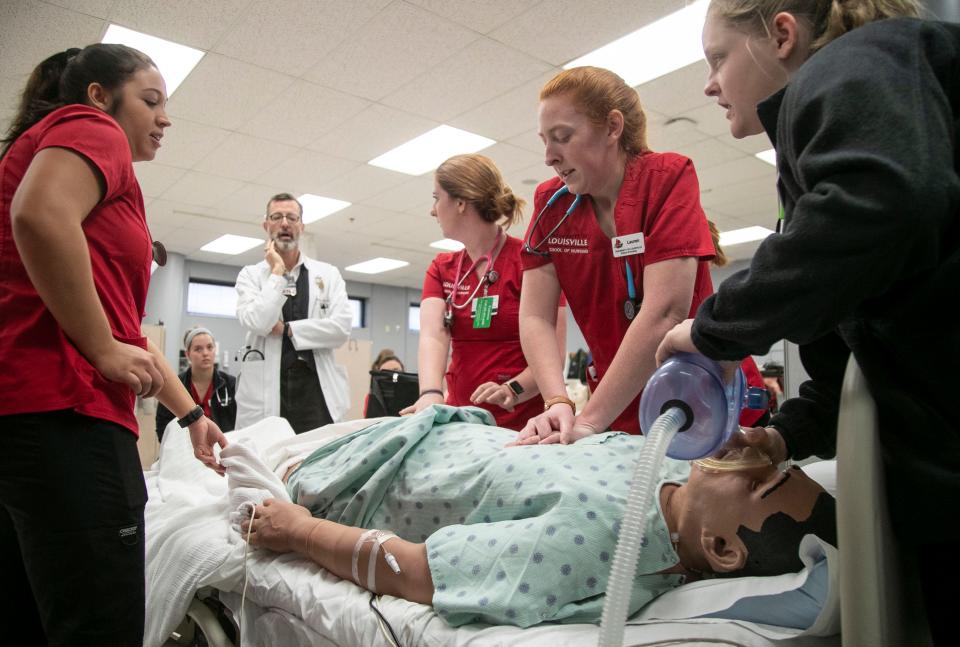Why nursing shortages still have a grip on Kentucky's health care system: Opinion
Studies suggest we’ve entered the endemic phase of the pandemic, but the impact COVID-19 left on our health care workforce continues to radiate across the commonwealth. This is expected to continue for at least the next three years because many health care workers chose to retire early or change careers because of the stress and anxiety this public health crisis placed on our health care systems.
Kentucky is not immune to the ongoing shortage of nurses. In fact, the Kentucky Hospital Association recently released its 2022 Workforce Survey Report, which reported 13,423 full-time equivalent vacancies at the end of 2021. Registered nurses and licensed practical nurses made up the largest portion of those openings.
As we approach Daylight Saving Time on Nov. 6 and honor night shift nurses and health care workers who will work the 2 a.m. hour twice to ensure quality patient care is delivered at all hours, we’re reminded of yet another layer to this critical field and the fatigue it feels day in and day out. As an organization, Western Governors University is reflecting on the state of the health care workforce. This shortage of skilled employees in health care is on an unsustainable trajectory and has the potential to impact the level of care for patients. However, hospital leaders have tools they can leverage to alleviate this strain, and it’s time to put it into practice.

More:We knew Kentucky's hospitals had a nursing shortage. Here’s how bad it really is
Address the shortage of preceptors.
Preceptors are vital resources for newer nurses entering this field because they are experienced individuals who can help students translate what they’ve learned in the classroom into real world application. However, the volume of nurses who are willing to serve as preceptors has drastically decreased as nurses retire or exit the field. In Kentucky, a registered nurse only needs one year of experience to serve as a preceptor to younger nurses vying to break into the profession. Because millennials now make up more than half of the registered nurses in Kentucky, health care leaders should encourage – and perhaps incentivize – this emerging age demographic to mentor their younger counterparts as a way to grow the talent pipeline and retain the next generation of healthcare providers.
Eliminate barriers of entry into necessary degree programs.
Health care leaders also carry a responsibility to help breakdown barriers for entry into degree programs that have the potential to be mutually beneficial to the organization and the employee. By partnering with competency-based higher education institutions, workers can gain access to affordable and accessible education opportunities to help upskill and retain talent in all areas of health care. This is especially true for those starting in positions such as medical assistant, licensed practical nurse and more. This creates more opportunities for other healthcare workers to grow in their career and can emerge from the heavy weeds of patient care and tap into more skilled work.
More:Most of Kentucky's counties have primary care doctor shortages. Here's why it matters
Find ways to offer flexibility and balance to healthcare workers.
In this post-pandemic world, the health care sector is competing against others who may be able to offer its workforce more flexibility, which can help establish a better work-life balance for employees. Because this is not a profession that can be done remotely, leaders need to take a hard look at how it can provide nurses and health care workers with the valuable benefits and perks that allow them to live optimally, and rest and recharge, so they deliver quality patient care with less stress. Not only is this important to attract and retain talent, it also has a direct impact on the quality of care. Patient care will suffer if hospitals continue to operate understaffed and overworked. This will negatively impact a healthcare facility’s quality metrics and affect their funding, making it that much more difficult to retain workers.
While life for many has seemingly returned to what it looked like before the pandemic, it’s abundantly clear our healthcare systems continue to deal with its fallout. Our nursing workforce plays a pivotal role in patient care and it cannot continue down its current path without intervention.
Alison Bell has more than 20 years of higher education leadership experience and is the regional vice president of Western Governors University, a nonprofit, online university offering 60+ degrees in the four colleges of business, teaching, I.T. and health/nursing.
This article originally appeared on Louisville Courier Journal: Nursing shortages still have a grip on Kentucky's health care system

